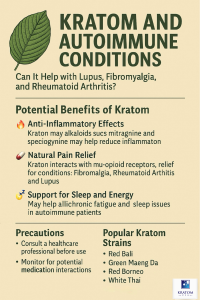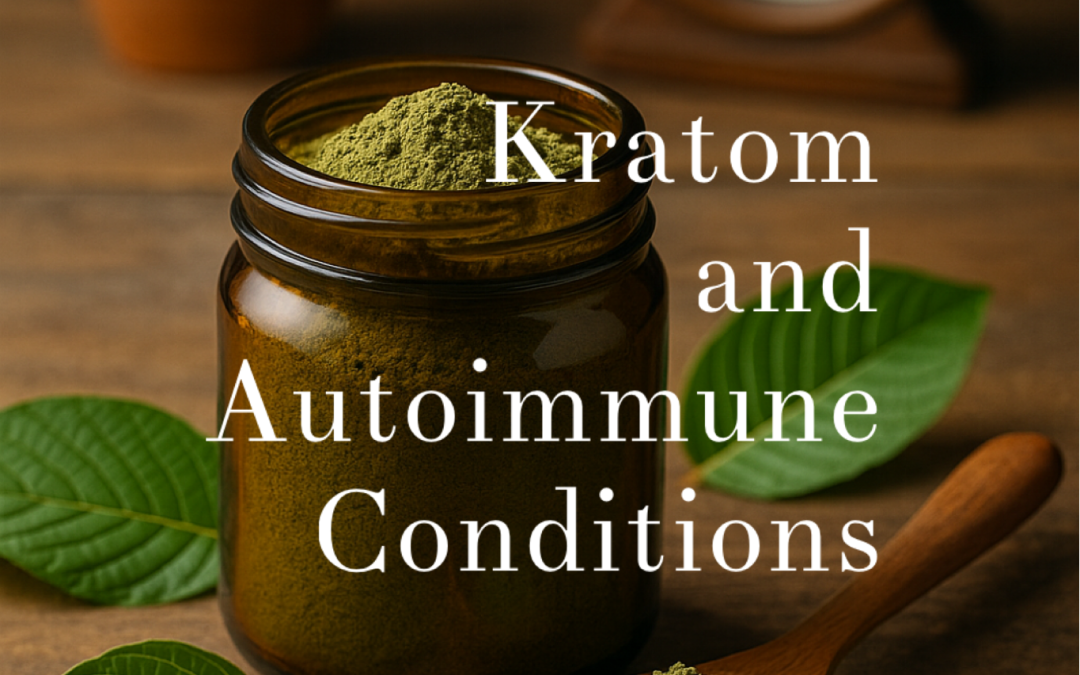🌿 Kratom and Autoimmune Conditions: Can It Help with Lupus, Fibromyalgia, and Rheumatoid Arthritis?
Exploring the Potential of Kratom for Pain, Inflammation, and Fatigue Relief
Living with an autoimmune condition like lupus, fibromyalgia, or rheumatoid arthritis means dealing with constant pain, inflammation, and fatigue. Many people are turning to natural remedies to ease their symptoms—especially when conventional medications come with unwanted side effects. One such option gaining attention is kratom. But is kratom really helpful for autoimmune conditions? And how does it interact with chronic pain and the immune system? In this in-depth guide, we’ll explore what the science says about kratom and autoimmune conditions, how its alkaloids may support symptom management, and what real users have to say about their experiences.
📌 Key Points: Kratom and Autoimmune Symptom Relief
-
🧪 Kratom contains alkaloids that may reduce inflammation, modulate pain, and improve mood
-
💊 It may provide natural relief for chronic pain, joint stiffness, and fatigue
-
🔥 Conditions like fibromyalgia, lupus, and RA share symptoms kratom may help ease
-
🚨 Kratom is not a cure and should not replace prescribed immunosuppressive therapy
-
✅ Users should focus on moderate doses, rotation, and quality sourcing
🧠 What Is Kratom and How Does It Work?
Kratom (Mitragyna speciosa) is a tropical plant native to Southeast Asia. It contains over 40 alkaloids, with mitragynine and 7-hydroxymitragynine being the most studied. These compounds interact with the brain’s opioid and adrenergic receptors, potentially offering:
-
🔹 Pain relief
-
🔹 Improved mood and energy
-
🔹 Reduced inflammation
-
🔹 Better sleep and stress regulation
🦠 Understanding Autoimmune Conditions
 Autoimmune diseases like lupus, fibromyalgia, and rheumatoid arthritis (RA) occur when the immune system mistakenly attacks healthy tissue. These disorders often involve:
Autoimmune diseases like lupus, fibromyalgia, and rheumatoid arthritis (RA) occur when the immune system mistakenly attacks healthy tissue. These disorders often involve:
-
Chronic pain and stiffness
-
Fatigue and cognitive fog (“fibro fog”)
-
Inflammation of the joints, muscles, and connective tissue
-
Sensitivity to stress and poor sleep
While treatments typically involve NSAIDs, corticosteroids, or immunosuppressants, many people seek natural alternatives or complements to manage symptoms more holistically.
🔬 How Kratom May Help: Scientific Insight into Pain and Inflammation
🧪 Anti-inflammatory Properties
Several studies suggest kratom alkaloids have anti-inflammatory effects:
-
A 2014 study in Asian Pacific Journal of Tropical Biomedicine found kratom leaf extract reduced inflammation markers in animal models.
-
Speciogynine, one of kratom’s lesser-known alkaloids, shows potential for muscle relaxation and inflammation modulation.
💊 Pain Relief via Opioid Receptor Interaction
Mitragynine and 7-hydroxymitragynine bind to mu-opioid receptors, which may:
-
Block pain signals
-
Reduce nerve hypersensitivity
-
Improve daily function without the side effects of synthetic opioids
📖 According to a 2021 review in Frontiers in Pharmacology, kratom alkaloids exhibit analgesic and anti-inflammatory effects that may benefit chronic pain conditions.
🧘 Kratom for Fibromyalgia: Soothing Pain and “Fibro Fog”
People with fibromyalgia often deal with widespread muscle pain, sleep issues, and cognitive fog. Kratom may help:
-
Ease body aches and tension (especially with Red Bali or Green Maeng Da)
-
Improve energy and focus with White Thai in low doses
-
Support restorative sleep using Red Borneo
🔥 Kratom for Rheumatoid Arthritis: Joint Pain and Swelling Relief
RA involves painful joint inflammation and stiffness, often in the hands, knees, or hips. Kratom’s anti-inflammatory properties may help:
-
Reduce morning stiffness
-
Improve mobility throughout the day
-
Decrease reliance on NSAIDs
Strains like Red Maeng Da and Red Indo are commonly used by people managing RA symptoms.
🩺 Kratom and Lupus: Managing Fatigue and Muscle Aches
Lupus is a complex autoimmune disease that affects multiple systems in the body. While kratom cannot treat the condition, it may provide symptomatic relief for:
-
Fatigue (with green or white strains)
-
Joint and muscle pain (with red strains)
-
Mental exhaustion and mood regulation
⚠️ Note: Always consult your doctor before using kratom with lupus, especially if you are taking immunosuppressants or corticosteroids.
🍃 Best Kratom Strains for Autoimmune Support
| Strain | Best For |
|---|---|
| Red Bali | Pain relief, sleep, calming inflammation |
| Green Maeng Da | Balanced energy + inflammation control |
| Red Borneo | Muscle relaxation, mood stabilization |
| White Thai | Gentle energy and cognitive clarity |
| Red Maeng Da | Deep relaxation and tension relief |
📏 Dosage Guidelines for Autoimmune Symptom Relief
| User Type | Recommended Dose |
|---|---|
| Beginner | 1.5 – 2 grams |
| Intermediate | 2 – 4 grams |
| Experienced User | 4 – 5.5 grams (max daily) |
🕒 Effects typically begin within 30–45 minutes and last 4–6 hours.
✅ Tip: Always start low and rotate strains to prevent tolerance.
⚠️ Precautions for Autoimmune Patients
-
Talk to your doctor before using kratom, especially if you take biologics, steroids, or immunosuppressants
-
Choose lab-tested kratom from reputable sources
-
Avoid high doses or frequent use, which can increase side effects
-
Monitor for interactions with medications or underlying conditions
🛒 Where to Buy Safe Kratom for Pain and Inflammation
When managing an autoimmune condition, quality matters. Look for kratom that is:
-
✅ Third-party lab tested for contaminants and alkaloid content
-
✅ Clearly labeled by strain and origin
-
✅ Backed by verified user reviews
🔎 Kratom USA offers premium strains like Red Bali and Green Maeng Da with fast shipping and strict quality control.
❓ FAQ: Kratom and Autoimmune Conditions
Can kratom cure autoimmune diseases?
No. Kratom can help manage symptoms like pain, fatigue, and inflammation, but it cannot cure the underlying disease.
Is kratom safe for people with lupus or RA?
Some users report benefits, but kratom may interact with medications. Always consult your doctor.
Which strain is best for fibromyalgia pain?
Many users prefer Red Bali for muscle pain and Green Maeng Da for daytime energy and pain relief.
Can I take kratom every day?
It’s best to rotate strains and take periodic breaks to avoid building tolerance or dependence.
Is kratom safer than opioids for autoimmune pain?
Kratom may offer opioid-like pain relief with fewer risks, but it must still be used responsibly.
🌿 Final Thoughts: Can Kratom Help with Autoimmune Conditions?
While kratom is not a medical treatment or cure for autoimmune diseases, it shows real promise as a natural way to ease chronic pain, reduce inflammation, and improve quality of life. For people with conditions like fibromyalgia, rheumatoid arthritis, or lupus, kratom may be a supportive tool—especially when used responsibly and in conjunction with professional care.
Always prioritize quality, moderation, and medical guidance. And if you’re ready to explore kratom for autoimmune symptom relief, start with a trusted source like KratomUSA.com.


